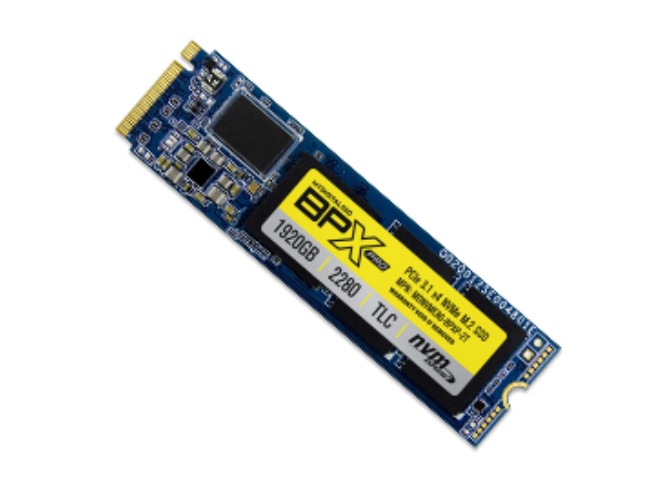MyDigitalSSD's BPX Pro M.2 NVMe SSDs Debut With Up to 2TB
MyDigitalSSD’s anticipated BPX Pro M.2 PCIe 3.1 x4 NVMe SSDs have arrived, with capacities up to 2TB.
The new MyDigitalSSD BPX (short for Bullet Proof eXpress) Pro series SSDs feature the latest second-generation Phison E12 controller and Toshiba BiCS3 TLC NAND flash, which in combination offer sequential read and write speeds up to 3,400MB/s and 3,100MB/s, respectively, in addition to fast 4K random performance. The E12 controller also supports AES-256, TCG Opal and TCG Pyrite encryption (for secure file access) and APST, ASPM and L1.2 power saving modes (used for maximizing notebook battery life).
There are four new drives in total, all of which run on the NVMe 1.3 protocol and sport an M.2 2280 form factor with a PCIe 3.1 x4 interface. The SSD comes in 240GB, 480GB, 960GB (1TB) and 1920GB (2TB) capacities and are backed by a five-year, 3,115TBW (terabytes written) warranty.
The new MyDigitalSSD BPX Pro M.2 PCIe 3.1 x4 NVMe SSDs are available for preorder from various online retailers (including Amazon and MyDigitalDiscount) priced at $99.99, $149.99, $279.99 and $599.99 for the 240GB, 480GB, 1TB and 2TB models, respectively. The drives are set to ship mid-September.
Get Tom's Hardware's best news and in-depth reviews, straight to your inbox.
Derek Forrest was a contributing freelance writer for Tom's Hardware. He covered hardware news and reviews, focusing on gaming desktops and laptops.
-
mikewinddale "The E12 controller also supports AES-256, TCG Opal and TCG Pyrite encryption (for secure file access)"Reply
Can we get a short guide to encryption for home users? I have a desktop computer with all my financial data on it (e.g. Social Security, bank accounts), and I don't want a robber who breaks into my house and steals my computer to have access.
So what are my options? Windows 10 Pro has BitLocker, but most drives aren't eDrive. So that's software encryption, and it's slower.
I can use a boot HDD password, but I'm not sure how secure that is. Does TCG interface with the boot ATA security? What about for an NVMe drive? Does that use ATA security?
I know there's third party software, like WinMagic. But that's more money and complexity.
Can we get a guide for regular folks who want reasonable security at a reasonable price? -
a.b.martin Will have a slc cache like the new toshiba 6 cause that enforces lies, as the max write speed is using tye cache only for a few seconds or GB,s so please take care, also dont use q1t32 like on crystql 6, use trie sequential tools like 5.5 crystal and use sayb32gb files to test and avoid slc cacheReply -
seanwebster Reply21296184 said:Will have a slc cache like the new toshiba 6 cause that enforces lies, as the max write speed is using tye cache only for a few seconds or GB,s so please take care, also dont use q1t32 like on crystql 6, use trie sequential tools like 5.5 crystal and use sayb32gb files to test and avoid slc cache
The XG6's write performance isn't a lie. Almost every new TLC based SSD out today utilize an SLC cache for write acceleration. Some have larger ones, some have smaller ones. The XG6 simply has a smaller one. And even so, its native to TLC write performance at the 1TB capacity is really fast. 1500MB/s is faster than the 970 EVO, ADATA XPG GAMMIX S11, WD Black, Plextor M9Pe, Intel 660P, and faster than any SATA SSD. Besides that in order to actually saturate that, you need an equally as fast drive/array to write to it, which isn't that common.
Crystal Disk Mark 6 allows you to test at QD1, which you can see in the review.
